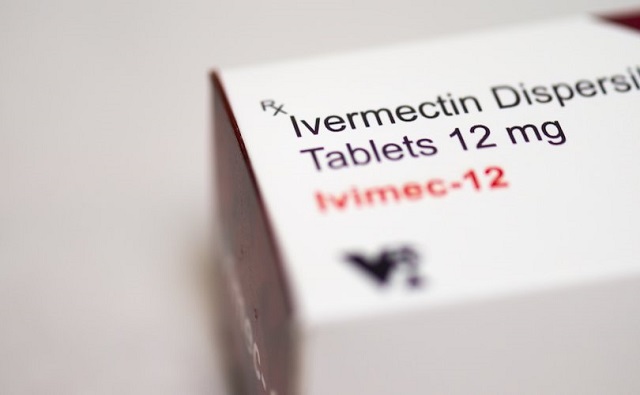COVID-19
You won’t believe the irony of this doctor’s punishment for using ivermectin to treat COVID

From LifeSiteNews
This punishment forced the physician to ‘re-learn’ that what they did with ivermectin is exactly what they should have done!
When I heard the following story I was flabbergasted and knew that I must share it. It is one of those truthful tales that leaves you shaking your head in near disbelief…
I recently chatted with a physician who had their license restricted because they used ivermectin to prevent severe disease and save the lives of their patients with COVID-19. They did this because they kept abreast of the latest evidence with respect to ivermectin and COVID-19. As we all know, this challenged the prevailing but now ever-so-obviously misleading “COVID-19 narrative” that pervaded the past few years. This doctor is a gem. We need our hospitals and medical practices filled with these kinds of doctors; not the parrots that could only regurgitate “safe and effective” whenever their lips parted.
The licensing body for this physician made them undergo re-training so they could become educated about what the primary scientific literature says about COVID-19. Remember, a key reason this doctor was forced into “re-training” is because they dared to follow the real science and promote ivermectin as a truly safe and truly effective early intervention strategy to protect people from getting severe COVID-19. They had successfully implemented this strategy with many patients, thereby saving many lives. Then, their ability to do this was stripped from them because the cheap, off-patent, previously readily available drug that was deemed one of the safest and most important by the World Health Organization, was vilified. The ability to re-purpose safe drugs like ivermectin was revoked.
With this background in mind, check out what happened during this great doctor’s “re-education program”…
They were required to do some of their re-education using a website at McMaster University, which is in the city of Hamilton in the province of Ontario in the country of Canada. This university lays claim to being the birth-place of what is called “evidence-based medicine” (it seems obvious to me that the practice of modern medicine should always be based on evidence, but my purpose here is not to delve into the nomenclature). Here is what they say at this link:
McMaster and the Faculty of Health Sciences is considered the birthplace of evidence-based medicine, which is described as one of the most important medical advances in the past 150 years, according to the British Medical Journal. EBM integrates the best research data with clinical expertise and patient values, with the goal to use the best evidence to give patients the best possible care. [Emphasis added.]
This sounds great, doesn’t it?
They offer resources on this webpage to allow physicians to find the evidence they need to “give patients the best possible care”:

Under the heading “Find Evidence,” McMaster University states the following:
We search the published literature and compile public health relevant reviews – eliminating your need to search and screen individual databases.
Did you catch that? A physician would not need to search elsewhere because McMaster University has already done this for them; they have identified the best available evidence. Remember this!
If you click on the link on the page that says “Search healthevidence.org,” it takes you to a page where, as implied, one can search for health evidence with the intent to provide the highest quality, vetted data to be used “to give patients the best possible care.”
The good doctor told me that one of their searches was for “ivermectin, covid-19.” Considering that they were undergoing “re-education” for having the gall to use ivermectin in their personal quest to “give [their own] patients the best possible care,” they were shocked by what they found. And I was so shocked by what I heard that I immediately did the search myself to confirm it. So, last night (November 28, 2023), I typed “ivermectin, covid-19” into the search engine:

And this was the result:

Note that only one article came up. But, it certainly does look like a good one. After all, it is a systematic review, meta-analysis, and trial sequential analysis. It was vetted by McMaster University, the birthplace of “evidence-based medicine,” and highlighted as the key document to, as the title of the article implies, “inform clinical guidelines.” “Health Evidence” (i.e., McMaster University) gave it a high rating.
When you select the article, this is what you see:

Here is the full citation:
Bryant A, Lawrie TA, Dowswell T, Fordham EJ, Mitchell S, Hill SR, et al. (2021). Ivermectin for prevention and treatment of COVID-19 infection: A systematic review, meta-analysis, and trial sequential analysis to inform clinical guidelines. American Journal of Therapeutics, 28(4), e434-e460.
I clicked on “View Quality Assessment” and this is what it looks like:

Here is a close-up:

It gets highly rated; an 8 out of 10 to be exact. Note that it gets a checkmark for “the certainty of the review’s conclusions.” After all, a physician would want to be certain that the evidence they are using to inform their clinical practice is solid.
So, brace yourself for this. The article draws the following conclusions:
[E]vidence finds that large reductions in COVID-19 deaths are possible using ivermectin. Using ivermectin early in the clinical course may reduce numbers progressing to severe disease. The apparent safety and low cost suggest that ivermectin is likely to have a significant impact on the SARS-CoV-2 pandemic globally.
Can you believe that a physician who was forced to undergo this “re-education” process due to their “inappropriate” use of ivermectin to save the lives of their patients had to be exposed to this sheer hypocrisy? This is a doctor who not only drew these same conclusions based on their own search of the literature, but they witnessed these benefits multiple times in their own practice. Yet, they were punished for following the science. And this punishment forced them to “re-learn” that what they did with ivermectin is exactly what they should have done!

Highly-trained physicians should not be forced to endure this kind of circular hypocrisy!
I conducted my own extensive review of the literature with respect to ivermectin and COVID-19. Especially when one removes the several studies that had fatal design flaws, I came to the same conclusion as both the good doctor and McMaster University. Sadly, this conclusion that “large reductions in COVID-19 deaths are possible using ivermectin” was never promoted by the power-brokers of public health. So, in the present day, this conclusion needs to be modified to say:
Large reductions in COVID-19 deaths WERE possible using ivermectin.
I mourn for the many people that would have been alive today had physicians been allowed to “follow the [REAL] science.”
As a scientist of integrity I am appalled by how our medical professionals of integrity have been and are still being treated. It is abhorrent. I will stand shoulder-to-shoulder with these brothers and sisters and continue to call out the hypocrisies of their health care licensing bodies. If the public cares about their health, they will too. After all, we should all want to be cared for by critically thinking, deeply caring health professionals, not the parrots that have proven to be highly susceptible to propagandizing.
Perhaps it is time for the people running the colleges that oversee health professionals to undergo re-education.
Who wants to take a guess as to how long it will take for McMaster University to alter the results of this particular literature search to match “the narrative” as opposed to the truth?
Reprinted with permission from COVID Chronicles.
COVID-19
NIH Quietly Altered Definition For Gain-Of-Function Research On Its Website, Former Fauci Aide Confirms

 From the Daily Caller News Foundation
From the Daily Caller News Foundation
By JASON COHEN
National Institutes of Health (NIH) Principal Deputy Director Lawrence Tabak confirmed on Thursday that his agency’s communications department altered NIH’s definition for gain-of-function research, with the change being “vetted” by “experts.”
The NIH until Oct. 20, 2021 defined this research as “modif[ying] a biological agent so that it confers new or enhanced activity to that agent,” while “some scientists use the term broadly to refer to any such modification,” according to the House Oversight Committee. Republican Rep. Nicole Malliotakis of New York questioned Tabak, a former aide to Dr. Anthony Fauci, about the agency changing its definition of the research on its website, asking him who authorized the alteration.
WATCH:
The current website does not define gain-of-function research, but asserts this research is usually uninvolved with enhanced potential pandemic pathogens.
“The change was made by our communications department because of the confusion that people have about the generic term of gain-of-function and the specific term gain-of-function,” Tabak testified.
Malliotakis responded by suggesting the communications department would not be qualified to make a change like this and must have had other input.
“The content was vetted,” Tabak testified. “By individuals who are subject-matter experts.”
Fauci firmly denied that the National Institute of Allergy and Infectious Diseases (NIAID) funded gain-of-function research on bat-based coronaviruses at the Wuhan Institute of Virology (WIV) before the COVID-19 pandemic during a Senate hearing in May 2021.
“The NIH has not ever and does not now fund gain of function research in the Wuhan Institute of Virology,” Fauci said.
Tabak testified on Thursday that the NIH did fund this research at the Wuhan Institute of Virology, but it “depends on [the] definition.”
The NIAID, which Fauci previously led, funded the nonprofit group EcoHealth Alliance to study bat-based coronaviruses in China that consisted of the transfer of $600,000 to the WIV, the Daily Caller News Foundation previously reported.
COVID-19
COVID Lab Leak: Over four later, EcoHealth Alliance funding is finally suspended

From Heartland Daily News
Thursday, May 16, 2024
Federal Funding Stripped From Nonprofit at Center of COVID Lab Leak Controversy
Today, the Biden administration suspended federal funding to the scientific nonprofit whose research is at the center of credible theories that the COVID-19 pandemic was started via a lab leak at the Wuhan Institute of Virology.
This morning, the U.S. Department of Health and Human Services (HHS) announced that it was immediately suspending three grants provided to the New York-based nonprofit EcoHealth Alliance (EHA) as it starts the process of debarring the organization from receiving any federal funds.
“The immediate suspension of [EcoHealth Alliance] is necessary to protect the public interest and due to a cause of so serious or compelling a nature that it affects EHA’s present responsibility,” wrote HHS Deputy Secretary for Acquisitions Henrietta Brisbon in a memorandum signed this morning.
For years now, EcoHealth has generated immense controversy for its use of federal grant money to support gain-of-function research on bat coronaviruses at the Wuhan lab.
In a memo justifying its funding suspension, HHS said that EcoHealth had failed to properly monitor the work it was supporting at Wuhan. It also failed to properly report on the results of experiments showing that the hybrid viruses it was creating there had an improved ability to infect human cells.
Congressional Republicans leading an investigation into EcoHealth’s research in Wuhan, and the role it may have played in starting the pandemic via a lab leak, cheered HHS’s decision.
“EcoHealth facilitated gain-of-function research in Wuhan, China without proper oversight, willingly violated multiple requirements of its multimillion-dollar National Institutes of Health [NIH] grant, and apparently made false statements to the NIH,” said Rep. Brad Wenstrup (R–Ohio), chair of the House’s Select Subcommittee on the Coronavirus Pandemic in a statement. “These actions are wholly abhorrent, indefensible, and must be addressed with swift action.”
Beginning in 2014, EcoHealth received a grant from NIH’s National Institute of Allergies and Infectious Diseases (NIAID) to study bat coronavirus in China. Its initial scope of work involved collecting and cataloging viruses in the wild and studying them in the lab to spot which ones might be primed to “spillover” into humans and cause a pandemic.
Soon enough, EcoHealth used some of the viruses they’d collected to create “chimeric” or hybrid viruses that might be better able to infect human lung cells in genetically engineered (humanized) mice.
This so-called “gain-of-function” research has long been controversial for its potential to create deadly pandemic pathogens. In 2014, the Obama administration paused federal funding of gain-of-function research that might turn SARS, MERS, or flu viruses into more transmissible respiratory diseases in mammals.
In 2016, NIH flagged EcoHealth’s work as likely violating the 2014 pause.
EcoHealth President Peter Daszak argued to NIH at the time that the viruses his outfit was creating had not been proven to infect human cells and were genetically different enough from past pandemic viruses that they didn’t fall under the Obama administration pause.

Wuhan Institute of Virology and Peter Daszak of EcoHealth Alliance
NIH accepted this argument under the condition that EcoHealth immediately stop its work and notify the agency if any of its hybrid viruses did show increased viral growth in humanized mice.
But when these hybrid viruses did show increased viral growth in mice, EcoHealth did not immediately stop work or notify NIH. It instead waited until it submitted an annual progress report in 2018 to disclose the results of its experiments.
A second progress report that EcoHealth submitted in 2021, two years after its due date, also showed its hybrid viruses were demonstrating increased viral growth and enhanced lethality in humanized mice.
In testimony to the House’s coronavirus subcommittee earlier this month, Daszak claimed that EcoHealth attempted to report the results of its gain-of-function experiments on time in 2019, but was frozen out of NIH’s reporting system.
The HHS memo released today says a forensic investigation found no evidence that EcoHealth was locked out of NIH’s reporting system. The department also said that EcoHealth had failed to produce requested lab notes and other materials from the Wuhan lab detailing the work being done there and the lab’s biosafety conditions.
These all amount to violations of EcoHealth’s grant agreement and NIH grant policy, thus warranting debarment from future federal funds, reads the HHS memo.
That EcoHealth would be stripped of its federal funding shouldn’t come as too great a shock to anyone who watched Daszak’s congressional testimony from earlier this month. Even Democrats on the committee openly accused Daszak of being misleading about EcoHealth’s work and manipulating facts.
Rep. Raul Ruiz (D–Calif.), the ranking Democrat on the House’s coronavirus subcommittee, welcomed EcoHealth’s suspension, saying in a press release that the nonprofit failed its “obligation to meet the utmost standards of transparency and accountability to the American public.”
An HHS Office of the Inspector General report from last year had already found that EcoHealth had failed to submit progress reports on time or effectively monitor its subgrantee, the Wuhan Institute of Virology.
When grilling Daszak, Democrats on the Coronavirus Subcommittee went to great lengths to not criticize NIH’s oversight of EcoHealth’s work. The HHS debarment memo likewise focuses only on EcoHealth’s failures to abide by NIH policy and its grant conditions.
Nevertheless, it seems pretty obvious that NIH was failing to abide by the 2014 pause on gain-of-function funding when it allowed EcoHealth to go ahead with creating hybrid coronaviruses under the condition that they stop if the viruses did prove more virulent.
NIH compounded that oversight failure by not stopping EcoHealth’s funding when the nonprofit did, in fact, create more virulent viruses, and not following up on a never-submitted progress report detailing more gain-of-function research until two years later.
The House Subcommittee’s investigation into NIH’s role in gain-of-function research at the Wuhan lab is ongoing. Tomorrow it will interview NIH Principal Deputy Director Lawerence Tabak. In June, it will interview former NIAID Director Anthony Fauci.
Originally published by Reason Foundation. Republished with permission.
-

 Automotive2 days ago
Automotive2 days agoGovernments in Canada accelerate EV ‘investments’ as automakers reverse course
-

 conflict22 hours ago
conflict22 hours agoWhite House Reportedly Worried About Russia’s Sudden Momentum Months After Biden Declared Putin ‘Already Lost’ War
-

 Health1 day ago
Health1 day agoSouth Korean president declares low birth rate a ‘national emergency,’ plans new ministry to address it
-

 COVID-192 days ago
COVID-192 days agoJapan’s most senior cancer doctor: COVID shots are ‘essentially murder’
-

 Economy2 days ago
Economy2 days agoBiden signs suicidal ‘No Coal’ pact, while rest of world builds 1,000 new plants
-

 Crime23 hours ago
Crime23 hours agoSlovakian prime minister who opposed WHO Pandemic Treaty shot in assassination attempt
-

 Alberta1 day ago
Alberta1 day agoFortis et Liber: Alberta’s Future in the Canadian Federation
-

 Health1 day ago
Health1 day agoUK pediatrician who led review of child ‘transitions’ says US medical groups ‘misleading the public’








